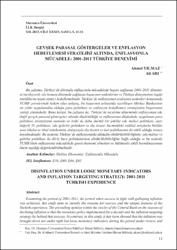| dc.contributor.author | Yılmaz, Ahmet | |
| dc.contributor.author | Arı, Ali | |
| dc.date.accessioned | 2021-12-12T16:49:59Z | |
| dc.date.available | 2021-12-12T16:49:59Z | |
| dc.date.issued | 2013 | |
| dc.identifier.issn | 2149-1844 | |
| dc.identifier.issn | 2587-2672 | |
| dc.identifier.uri | https://app.trdizin.gov.tr/makale/TVRZeU5qSTVPUT09 | |
| dc.identifier.uri | https://hdl.handle.net/20.500.11857/2173 | |
| dc.description.abstract | Bu çalışma, Türkiyede dörtnala enflasyonla mücadelede başarı sağlanan 2001-2011 dönemi- ni inceleyerek, söz konusu dönemde sağlanan başarının nedenlerini ve Türkiye deneyiminin özgün niteliklerini tespit etmeyi hedeflemektedir. Türkiyede enflasyonun azalışının nedenleri konusunda TCMB çevrelerinde hakim olan anlayış, bu başarının arkasında özerkleşen Merkez Bankasının on yıldır uygulamakta olduğu para politikası ve enflasyon hedeflemesi stratejisinin başarısının yattığı yönündedir. Buna karşın, bu çalışma da; Türkiyede inceleme döneminde enflasyonun sıkı değil gevşek parasal göstergeler altında düşürüldüğü ve enflasyonun düşüşünde, uygulanan para politikası stratejisinin yanında ve belki de daha önemli bir şekilde sıkı maliye politikası, aşırı değerli TL politikası, sıkı gelirler politikası ve dış ticaret hacmindeki radikal artışlarla birlikte ucuz ithalat ve ithal rekabetinin, dolayısıyla dış ticaret ve kur politikasının da etkili olduğu ortaya koyulmaktadır. Bu nedenle Türkiyede enflasyondaki düşüşün sürdürülebilirliğinin; sıkı maliye ve gelirler politikası ile döviz kuru politikalarının sürdürülebilirliğine bağlı olduğu ve bu nedenle TCMBsinin enflasyonla mücadelede genel ekonomi yönetimi ve hükümetle etkili koordinasyonun önem taşıdığı değerlendirilmektedir. | en_US |
| dc.description.abstract | Examining the period of 2001-2011, the period when success in fight with galloping inflation was achieved, this study aims to identify the reasons for success and the unique features of the Turkish experience. The prevailing opinion within the circles of the Central Bank on the reasons of declining inflation is that the monetary policy implemented for a decade and the inflation targeting strategy lie behind that success. In contrast, in this study, it has been showed that the inflation was brought down not under tight but loose monetary indicators during the period under review, and along with the monetary policy strategy other factors such as the tight fiscal policy, an overvalued TL policy, strict incomes policy and external competition from cheap imports and import as a re- sult of the increases in the volume of trade might, i.e. foreign trade and exchange rate policy have been probably more effective. For this reason, it is assessed that the sustainability of disinflation in Turkey is attached to the the tight fiscal and incomes policy and sustainability of the exchange rate policy, and therefore effective coordination between the Central Bank and the overall management of the economy and the government has importance. | en_US |
| dc.language.iso | tur | en_US |
| dc.relation.ispartof | Marmara Üniversitesi İktisadi ve İdari Bilimler Dergisi | en_US |
| dc.rights | info:eu-repo/semantics/openAccess | en_US |
| dc.subject | Uluslararası İlişkiler | en_US |
| dc.title | Gevşek parasal göstergeler ve enflasyon hedeflemesi stratejisi altında, enflasyonla mücadele: 2001-2011 Türkiye deneyimi | en_US |
| dc.title.alternative | Disinflation under loose monetary indicators and inflation targeting strategy: 2001-2011 Turkish experience | en_US |
| dc.type | article | |
| dc.department | Fakülteler, İktisadi ve İdari Bilimler Fakültesi, İktisat Bölümü | |
| dc.identifier.volume | 35 | en_US |
| dc.identifier.issue | 1 | en_US |
| dc.identifier.endpage | 31.01.1900 | en_US |
| dc.relation.publicationcategory | Makale - Ulusal Hakemli Dergi - Kurum Öğretim Elemanı | en_US |



















